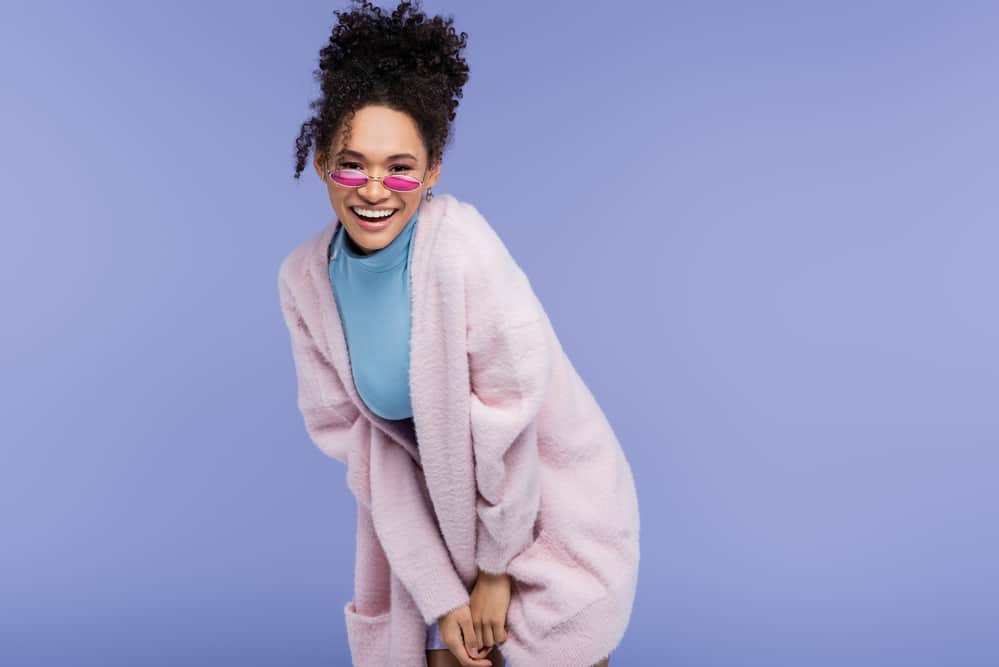
Have you ever gone to bed with perfect hair only to wake up to a greasy mess? We’ll bet you want to know what’s causing the problem and if there’s something you can do to prevent it.
In this article, we will explore the reasons why your hair gets greasy overnight and leave you with some helpful tips you can try out today!
Table of Contents
Why Does My Hair Get Greasy Overnight?
When your hair is greasy overnight, it's often caused by product buildup on your scalp, washing your hair too often, and overstimulating your sebaceous glands when massing your scalp too frequently.
Although, many factors contribute to an overnight grease fest. Fortunately, many of them can be remedied by implementing small changes in your hair care routine. But before you make any changes, it’s helpful to know what’s causing your greasy hair. We’ll get into that below:
Key Takeaways
- Oil Production and Hair Care: Excessive oil production in the scalp can be exacerbated by using the wrong products or too much hair product, leading to oily roots and greasy hair. Opt for a gentle shampoo and avoid overuse of hair conditioners and serums to maintain healthy hair growth.
- Hair Washing Frequency: Washing hair too frequently can stimulate excess sebum production, especially for fine or curly hair types. We recommend that ladies reduce their washing frequency, adapt to different hair types, balance the scalp's oil glands, and prevent oily strands.
- Product Build-up and Scalp Health: The build-up of hair care products on the scalp contributes to greasy roots and oily hair strands. A regular clarifying shampoo can help remove dead skin cells and product residue, promoting a healthy scalp and hair follicles.
- Pillowcase Material: Switching to a silk pillowcase can help reduce greasy scalp and oily hair, as cotton pillowcases may absorb natural oils and prompt overproduction of oil. Silk pillowcases also support shiny hair and prevent hair damage.
- Scalp Massage and Sebum Production: Limit scalp massaging to avoid stimulating oil glands excessively. This can lead to increased sebum production and greasy hair. A balanced haircare routine with the right amount of oil and minimal scalp disturbance is critical for avoiding greasy locks.

Washing Your Hair Too Often
While it’s common to think that not washing your hair often enough can lead to greasy hair, the opposite can be true. Washing your hair too often can cause your scalp to overproduce oil (or sebum).
This is your scalp’s innate response to being stripped of its natural oils. Depending on the thickness and texture of your hair, you can go a few days to a week between washes.
Decreasing your wash sessions also equates to less work for you and less wear and tear on your hair.
Product Buildup On Your Scalp
Applying hair products on your skin or the roots of your hair can lead to buildup on your scalp. This buildup can lead to your hair getting greasy much quicker than you’d expect.
To avoid this, make sure you apply products away from your scalp and rinse your hair thoroughly when you wash it.
Also, try to go for products with water listed as the first ingredient – oil and wax-based products are more likely to build up on the hair and scalp.

Massaging Your Scalp for Too Long
Few things feel better than a scalp massage while shampooing your hair. However, doing it for too long can cause an overstimulation of your sebaceous glands, leading to your hair getting greasy much faster.
To avoid this issue, don’t massage your scalp for more than a minute during each shampooing session.
Top Tips to Prevent Greasy Hair
If you want to keep your hair from getting greasy while you’re sleeping, this section is for you. Here’s we’ll share some tried and true tips to do the same.
Avoid Hot Showers or Baths Before Bed
No matter how amazing a really hot shower can feel, hot water can damage your hair. Experts recommend rinsing your hair in lukewarm water instead of hot water to minimize moisture loss.
But this change in routine can also minimize overstimulation of your sebaceous glands, which will decrease the likelihood of greasy hair and an oily scalp.

Use a Silk or Satin Pillowcase
Changing the type of pillowcase you use is recommended for many reasons, and one of them is avoiding greasy hair.
Cotton pillowcases can strip oil from your hair and skin, prompting your scalp to create more oil - one of the main causes of greasy hair.
Silk or satin pillowcases are more gentle on your hair, keeping your natural oils intact much better than their cotton counterparts.
And if that’s not enough reason to switch your pillowcase out, silk and satin pillowcases are also much nicer to your skin, helping prevent wrinkles and dry skin while you sleep!
Don’t Overapply Hair Oils or Serums
It can be easy to overdo it on hair products, especially if you have long or thick hair.
While hair oils and serums can be beneficial to the health and appearance of your hair, using too much of them can lead to product buildup, a common cause of greasy hair.
When using these products on your hair, follow the directions on the bottle – note the recommended application process and amount.
When in doubt, remember that it is better to start with less and add more than to use too much and end up with greasy hair!

Other Tips to Avoid Greasy Hair
In addition to the tips above, there are some other changes you can make in your routine to keep greasy hair at bay:
- Apply dry shampoo to your roots: Dry shampoo is formulated to help absorb excess oils in your hair. Try spraying your favorite dry shampoo onto your hair to absorb any extra oil.
- Space out moisturizing and deep conditioning sessions. If your hair is feeling or looking greasy and you regularly deep condition your hair, perhaps you need to deep condition less. With less oils and creams coating your strands, you’ll notice less grease. The same goes for moisturizers – an overzealous moisturizing routine will have your hair unnaturally shiny and oily. But if you cut back on the moisturizing products, you’ll see a decrease in the oil.

Is Greasy Hair a Sign of a Health Problem?
Having greasy hair isn’t a sign of an underlying health issue most of the time.
However, if you have tried at-home remedies and haven’t seen any improvements on your hair, we recommend reaching out to your primary care doctor.
Chronic greasy hair that doesn’t improve with at-home treatments can be a sign of a hormonal imbalance, though this is not very common.
Greasy hair can also result from issues with your diet. If topical treatments and routine changes aren’t working, you can talk to a dietician about dietary changes you can make to reduce your scalp’s oil production.
Sometimes, an oily scalp may be linked to eating too many processed carbs or saturated fats. When in doubt, it never hurts to reach out to a health care professional to clear up any concerns you have.
Products to Decrease Scalp Oiliness
Having the right products in your hair care arsenal can help tremendously with chronically greasy hair. But which ones should you choose?
We’ve rounded up a few of the best options to get you started!
Maple Holistics Oil Control Shampoo
This shampoo is recommended for anyone who has issues with oily hair or scalp. It is paraben and sulfate-free, so it cleanses your hair without the harshness of sulfate shampoos.
In addition, it has hair clarifying properties, so you can be sure it is working to rid your hair of any buildup or impurities that may be contributing to your greasy hair.

Living Proof Perfect Hair Day Dry Shampoo
If you’ve never used dry shampoo, you’re really missing out. Living Proof Dry Shampoo comes highly recommended by many people who have issues with greasy hair.
Free of silicones and parabens, this dry shampoo helps absorb oil in your hair and leaves it looking and smelling clean. Use it to remove oil in a snap or to put off your wash day by another day or two.
Nexxus Clean and Pure Sulfate-Free Scalp Scrub
This scalp scrub exfoliates your scalp gently, getting rid of any product buildup or other impurities that could lead to a greasy-looking scalp. It is sulfate and paraben-free and safe for all hair types.
- Why Does My Hair Get Oily So Fast
- Why Does My Hair Feel Waxy
- How To Get Vaseline Out of Hair Without Washing
- Using Aquaphor on Hair
In the end, everyone’s scalp and hair chemistry are different. If you try the above products and don’t like how your hair reacts, keep experimenting until you find the right product lineup for you.
Waking up to greasy hair can be an upsetting experience.
However, using the right products and techniques can eliminate excess oil in your hair and even prevent the oil from reappearing. We hope that this article has helped give you the tools you need to combat your greasy hair woes!




